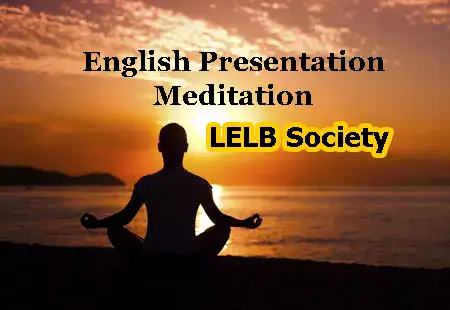Table of Contents
An English presentation on meditation and its numerous benefits to practice speaking and pronunciation for IELTS and TOEFL given by LELB Society’s members and students. Join LELB Society and give speeches in English for our detailed feedback.
English presentation on meditation
Reading practice on meditation benefits
What is Meditation?
Meditation is a practice that incorporates different techniques that help people focus their attention and achieve a heightened state of awareness. It can result in changes in consciousness and has been shown to have a number of health benefits.

Meditation involves sitting in a relaxed position and clearing your mind, or focusing your mind on one thought and clearing it of all others. You may focus on a sound, like “ooommm,” or on your breathing, counting, a mantra, or nothing at all.
Source: https://www.verywellmind.com/
Managing stress with meditation

Meditation isn’t about eliminating stress; it’s about managing it. A lot of that boils down to how we perceive stress. By altering our mindset, we can lessen the implications on our mental and physical health.
Stress often gets a bad rap, which is perhaps undeserved. Think where we would be, for example, if we didn’t have the distress signal that makes us flee from danger. Or if we didn’t feel pressed to finish a project or homework on time.
Some people even thrive in high-pressure careers, feeling completely in control in the fast lane and totally stressed out when things slow down. So the degrees of stress can vary widely person to person. Nevertheless, good experiences in our best interest will still bring stress. There’s no avoiding it.
Source: https://www.headspace.com
Meditation and emotional and physical wellbeing

When you meditate, you may clear away the information overload that builds up every day and contributes to your stress.
The emotional and physical benefits of meditation can include:
- Gaining a new perspective on stressful situations
- Building skills to manage your stress
- Increasing self-awareness
- Focusing on the present
- Reducing negative emotions
- Increasing imagination and creativity
- Increasing patience and tolerance
- Lowering resting heart rate
- Lowering resting blood pressure
- Improving sleep quality
Source: https://www.mayoclinic.org
Controls anxiety

Meditation can reduce stress levels, which translates to less anxiety. A meta-analysis including nearly 1,300 adults found that meditation may decrease anxiety. Notably, this effect was strongest in those with the highest levels of anxiety.
Also, one study found that 8 weeks of mindfulness meditation helped reduce anxiety symptoms in people with generalized anxiety disorder, along with increasing positive self-statements and improving stress reactivity and coping.

Another study in 47 people with chronic pain found that completing an 8-week meditation program led to noticeable improvements in depression, anxiety, and pain over 1 year.



